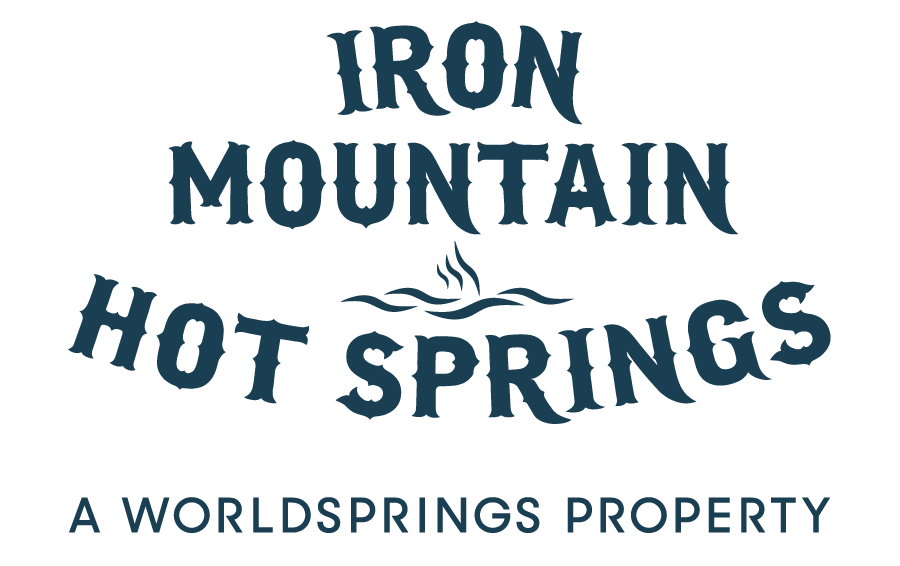New WorldSprings Experience Pools are Now Open! Discover
About Glenwood Springs, Colorado
Learn more about Glenwood Springs, Colorado and the Roaring Fork Valley
“Spa in the Mountains”
Located in the western part of the state of Colorado in the heart of the Rocky Mountains, Glenwood Springs lies at the confluence of the Roaring Fork River and the Colorado River at the northern most end of the Roaring Fork Valley. The county seat of Garfield County, Glenwood is best known as a historic year round destination for vacationers from around the world who wish to take advantage of the area’s scenic beauty and attractions, most notably Glenwood’s geothermal natural hot springs and healing waters.
In 2015, Glenwood Springs was named the “Most Vibrant Small Town Arts Environment in the United States” by Southern Methodist University and the 5th Best Place to Live in America by Outside magazine. It was also named the “Most Fun Town in America” by Rand McNally and USA Today in 2011.
History
Originally known as “Defiance,” a name sometimes still used by local teams or businesses, Glenwood Springs has a strong historical past dating back to 1883. At the time, Defiance was populated with the expected crowd of gamblers and gunslingers. The wife of Town Founder Isaac Cooper (Sarah) was having a hard time adjusting to the frontier life and, in an attempt to make her environment somewhat more comfortable, persuaded the founders to change the name to Glenwood Springs, Colorado, after her beloved hometown of Glenwood, Iowa.
The location of Glenwood Springs, as well as gaining a stop on the railroad, rapidly made it a center of commerce in the area. The city has seen famous visitors, including President Teddy Roosevelt, who spent an entire summer vacation living out of the historic Hotel Colorado. Doc Holliday, a wild west legend from the O.K. Corral gunfight, spent the final months of his life here and is buried in the town’s original Pioneer Cemetery above Bennett Avenue. Kid Curry is buried in the same location. Infamous serial killer Ted Bundy was imprisoned in the Glenwood Springs jail until he escaped on the night of December 30, 1977, an escape which went undetected for 17 hours.
Glenwood Springs was one of the first places in the United States to have electric lights. The original lighting was installed in 1897 inside of the Fairy Caves in Iron Mountain. Later, a dam was built in Glenwood Canyon, providing water for the Shoshone power plant. The plant began producing power on May 16, 1909, and retains the largest and oldest water rights to the Colorado River, the “Shoshone Call,” which is now far more valuable for the protection of Colorado River water rather than the minimal electricity produced.
Frequently Asked Questions about Glenwood Springs
What is Glenwood Springs famous for?
Glenwood Springs is famous for hot springs! Nomadic Ute Indian tribes originally inhabited the area and frequently bathed and soaked in the hot mineral waters. The history of the Iron Mountain Hot Springs property dates back to 1896, when the West Glenwood Health Spa opened. Over the next 100 years, it changed hands multiple times and also operated as the Wash Allen Bathhouse, the Gamba Mineral Springs, the Glenwood Health Spa, the Fort Defiance Bathhouse and the Iron Springs Spa.
When was Glenwood Springs Founded?
Originally named Defiance, Glenwood Springs was established in 1883 and incorporated on September 5, 1885.
What is the population of Glenwood Springs?
As of 2018, the population is estimated to be 9,917.
What is the elevation of Glenwood Springs?
The elevation is 5,761 ft (1,756 m), with coordinates of 39°33′2″N 107°19′29″W.
What notable people are from Glenwood Springs?
Famous people who have once called Glenwood Springs home include Kid Curry — Wild West outlaw and gunman; Doc Holliday — Wild West gunfighter, gambler, and dentist; Jim Irwin — U.S. Air Force Colonel and NASA astronaut; the eighth man to walk on the moon; Jack P. Juhan — U.S. Marine Corps Major general, who served in World War II and Korean War; Bobby Julich — bike racer and silver medalist at the 2004 Athens Olympics; Scott McInnis — former U.S. congressman from Colorado; Blake Neubert — artist; Sarah Schleper — Alpine skier; and John David Vanderhoof — former Colorado governor.
What is the geography of Glenwood Springs?
The town is located in the narrow mountain valleys that host the confluence of the Colorado River and the Roaring Fork River. The surrounding terrain is steeply contoured on all sides. Reddish colored sandstone cliffs surround the city. In fact, Glenwood is one of the most walkable towns in America, a distinction that has been recognized by PBS and Walking Magazine, including in the Walking Town Hall of Fame. The town's dense amenities and constrained geography make it a natural environment for pedestrians and cyclists, with extensive trails running throughout and around the city.
Hotels & Lodging
Home to an array of lodging options to suit every type of traveler, Glenwood Springs has approximately 1,500 rooms to choose from for any type of budget. Choose from well-appointed flagship accommodations and family-owned lodges to four-star historic hotels, cozy bed and breakfasts, and roomy VRBO’s and Airbnb’s. For added value and convenience, Iron Mountain Hot Springs has partnered with a number of lodging establishments in the area, so browse through a list of featured hotels and lodging for special offers and discount cards featuring our hot springs.
Frequently Asked Questions about Hotels in Glenwood Springs
What are the best historic hotels in Glenwood Springs?
There are two main historic hotels in town, the Hotel Colorado and Hotel Denver. Both date back to the early 19th century and each are within walking distance to downtown.
What are the best hotels in Glenwood Springs within walking distance of the Amtrak Station?
The Hotel Denver is directly across the street from the Amtrak Station, along with the Glenwood Canyon Brewpub, and the Hotel Colorado is within walking distance across the Colorado River via the pedestrian bridge.
What's the best budget-friendly hotel in Glenwood Springs?
There are several budget-friendly hotels in town, including The Hotel Glenwood Springs, which offers value-priced rooms, specials and packages along with an indoor waterpark for the kids, and Silver Spruce Inn, featuring great rates, free wifi, and hot breakfast.
What's the best pet-friendly hotel in Glenwood Springs?
There are multiple lodging properties that offer pet-friendly accommodations, including the Residence Inn by Marriott, Hotel Colorado, The Hotel Glenwood Springs, and Hotel Denver.
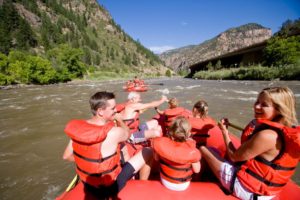 Roaring Fork Valley Activities
Roaring Fork Valley Activities
Glenwood is the perfect base of operations for outdoor activities. We’ve partnered with other Roaring Fork Valley outfitters listed in the link below to help provide the ultimate Roaring Fork Valley vacation. Add to your Iron Mountain Hot Springs visit with a great adventure—whitewater rafting in Glenwood Canyon and on the Roaring Fork River, jet boat river trips on the Colorado River, various hiking trails with spactacular views, like to Hanging Lake, bike rentals for cycling Glenwood’s extensive trail system, like the Glenwood Canyon Recreation Trail, Rio Grande Trail, and numerous intermediate and difficult mountain bike singletracks, horseback riding excursions, and off-road expeditions into the back-country.
Frequently Asked Questions about Glenwood Springs Activities
What are the top attractions to visit in Glenwood Springs?
Some of the best attractions in Glenwood include Glenwood Caverns Adventure Park, Iron Mountain Hot Springs, Hanging Lake, Hotel Colorado, and Doc Holliday's Grave.
What are the most popular things to do in Glenwood Springs with kids?
Some of the most popular things to do in Glenwood with kids include taking the Glenwood Gondola to the top of Iron Mountain and spend the day enjoying the thrill rides and cave tours of Glenwood Caverns Adventure Park, whitewater rafting on the Colorado River through Glenwood Canyon or on the Roaring Fork River, or spend the afternoon swimming at the indoor waterpark located in The Hotel Glenwood Springs.
Restaurants & Dining
Whatever you’re in the mood for, you’ll find it in Glenwood Springs. Restaurants in Glenwood run the gamut from quick, casual bites to eat to award-winning fine dining. From farm-to-table eateries to award-winning breweries, the Glenwood Springs restaurant scene is a consistent source of culinary delights. Start your day with a hearty, home-cooked breakfast at the Daily Bread. Enjoy the family-friendly Glenwood Canyon Brewpub for lunch and sample its hand-crafted brews. For dinner, downtown Glenwood features several award-winning restaurants all within walking distance of one another. For those who wish to laugh while they dine, Glenwood Vaudeville Revue keeps visitors in stitches with its hilarious comedy-musical dinner show.
Frequently Asked Questions about Glenwood Springs Restaurants
What are the best restaurants in Glenwood Springs?
Some of the best restaurants preferred by locals include Juicy Lucy's Steakhouse, The Pullman, Brava Modern Trattoria, Riviera, CO Ranch House, Smoke Modern Barbeque, and Glenwood Canyon Brewpub.
Where's the best place to have a beer in Glenwood Springs?
The award-wining Glenwood Canyon Brewpub offers homemade hand-crafted brews, including seasonal brews. Casey Brewing and Blending's beers are created with over 99% local Colorado ingredients and 100% bottle conditioned.
Who serves the best burger in Glenwood Springs?
The Grind, Glenwood Canyon Brewpub, and Vicco's Charcoalburger Drive-In serve the best burgers in town.
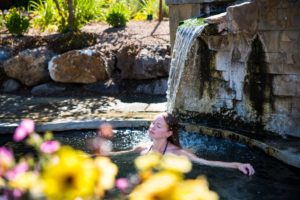 Hot Springs
Hot Springs
If enjoying iron Mountain Hot Springs isn’t enough, visitors can also enjoy Yampah Spa and Vapor Caves, where natural underground steam baths are fueled by local hot springs. The caves are filled with hot mineral steam which melts away tension and stress effortlessly. It’s a unique and relaxing experience. Originally used by the Ute Indians for both healing and rituals, today the Yampah Vapor Caves are one of only a few known natural vapor caves in North America that offer therapeutic steam naturally.
Frequently Asked Questions about Hot Springs in Glenwood Springs
What is the best hot springs in Glenwood Springs?
Situated along the Colorado River, Iron Mountain Hot Springs features 16 soaking pools of differing size, shape and temperature. Two of the soaking pools are ADA compliant, and each of the pools are connected with heated walkways to keep your toes warm in the winter. Open year round, Iron Mountain Hot Springs is a favorite for locals and visitors alike.
Is there any natural hot springs water in Glenwood Springs?
It is unusual to find a hot springs in Colorado that doesn’t treat its water with chlorine. At Iron Mountain Hot Springs, the water is pumped and stored in one of two insulated fiberglass holding tanks. After it leaves the holding tank, the water is pumped through a series of sand filters. The sand removes any sediment, including algae, that may be in the water. The result is crystal-clear water clarity in our soaking pools. Water replenishes every two hours which alleviates the need for chlorine and chemicals.
Does Iron Mountain Hot Springs close during inclement weather?
No, Iron Mountain Hot Springs does not close for inclement weather, however, we do recommend visitors take shelter inside the Bathhouse when lightening is within five miles of Glenwood until the storm has passed. In fact, one of the best times to experience the pools is during a snowfall in winter.
What are the natural healing powers of mineral water?
Some of the most common reasons for soaking in natural mineral waters are to revitalize the skin, calm the nerves, detoxify the body and refresh the oxygen levels. Many also turn to thermal mineral waters for health issues such as arthritis, fibromyalgia, skin conditions, depression, respiratory illnesses including asthma, and locomotor and circulatory diseases. Soaking in hot water can be relaxing and rejuvenating, and can help ease sore muscles and reduce stress. The jets from a whirlpool spa offer additional benefits in the form of hydrotherapy massage that can target specific parts of your body by simply moving around in the spa. There are more than 14 different minerals found in the analysis of the water at the Iron Mountain Hot Springs. The five most abundant minerals in the soaking pools are iron, sulfate, chloride, sodium and calcium. Iron and sulfate are known for their relaxing qualities.
Where does Iron Mountain Hot Springs water come from?
Iron Mountain Hot Springs’ water is sourced from three naturally-occurring springs—Hobo, Gamba and Redstone. The three natural hot springs emerge onto the Iron Mountain Hot Springs property with average water temperatures ranging from 105 to 108°F. The water is collected in the pump house, which is located behind the café, and then cooled to different temperatures before it’s distributed to the 16 soaking pools. The temperatures in the soaking pools range from 98 to 108°.
Spas
People have been flocking to Glenwood to experience local spas since the early 1880’s. As a global healing and wellness destination, Glenwood Springs spas offer treatments that incorporate mineral hot springs amenities and touch therapy modalities from around the world.
Shopping
When visiting the area, be sure to save enough time to shop and explore local businesses. From the quaint and locally owned boutique shops downtown to the beautiful Glenwood Meadows mall, visitors will find anything and everything they want in the local shopping scene.
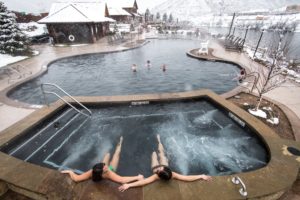 Weather
Weather
Glenwood Springs has a generally mild and semi-arid climate, much more consistently stable than that of the Front Range and most other parts of Colorado, though still decidedly continental and prone to periods of extreme weather. Microclimates dominate the area, with areas close to the rivers often much more damp and cool than hillsides. Glenwood gets some kind of precipitation, on average, 97 days per year, and around 239 sunny days per year.
Frequently Asked Questions about Glenwood Springs Weather
On average how much snowfall does Glenwood Springs receives each year?
On average, Glenwood receives 45 inches of snowfall per year. The US average is 28 inches of snow per year.
How hot does it get in Glenwood Springs in Summer?
The average temperature during summer is typically in the 80's, but isn't uncommon for temperatures to reach into the 90's. The average high in July is 87ºF, and the average annual high is 61ºF.
How cold does it get in Glenwood Springs in Winter?
Winters can be cold in the Roaring Fork Valley with the low temperature in January, on average, is 13ºF. During the day in January, the average high is 35ºF.
On average how much rainfall does Glenwood Springs receive each year?
The town typically receives 18 inches of rain, on average, each year. The US average is 38 inches of rain per year.
Directions to Glenwood Springs
Glenwood Springs is located just off I-70 and is close to several airports. Eagle County Airport is 30-miles (48-km) east of town; the Aspen/Pitkin County Airport is 40-miles (64-km) to the south; and Walker Field in Grand Junction is 90-miles (145-km) to the west. Amtrak’s California Zephyr has year-round, daily arrivals in Glenwood from points east and west.
Frequently Asked Questions about Traveling to Glenwood Springs
How far is Glenwood Springs from Denver?
On a good day without traffic, Glenwood Springs is approximately 2 hours and 40 minutes from Denver, Colorado heading west on Interstate 70. When there's traffic heading into the mountains from Denver, however, it can take as much as 4 hours or longer. The same can be said when heading back to Denver, especially during the winter ski season. It isn't out of the ordinary to take as long as 5 or 6 hours to return to Denver.
How far is Glenwood Springs from Colorado Springs?
Traveling via I-15 N and I-70 W, Glenwood Springs is approximately 222.6 miles from Colorado Springs, which will be about 4 hours of driving time without traffic.
How far is Glenwood Springs from Vail?
It will typically take 1 hour and 3 minutes to drive 61 miles on I-70 W from Vail.
How far is Glenwood Springs from Aspen?
Aspen is located 41.3 miles south of Glenwood Springs, and will typically take 54 minutes of driving time via CO-82 W.
How far is Glenwood Springs from Grand Junction?
Glenwood is located 86.5 miles northeast of Grand Junction via I-70 E. The typical drive time is 1 hour 20 minutes.
How far is Glenwood Springs from the Eagle County Regional Airport?
The Eagle/Vail Airport is located in the town of Gypsum on the eastern end of Glenwood Canyon, approximately 27.5 miles away. The typical drive time via I-70 W is 35 minutes.
Getting Around Town
Ride Glenwood Springs is the City’s year-round public transit bus service, operating daily from 6:53 a.m. to 7:53 p.m., at 30 minute intervals. The $1 fare can be paid in cash to the bus driver, and Seniors (65 and over) and children (age 5 and under) accompanied by an adult ride free. Passes purchased on the bus are valid for one day. Bus stops are located all around town near tourist attractions, the downtown area, shopping centers and neighborhoods.
The Roaring Fork Transportation Authority also serves the city of Glenwood Springs and the Roaring Fork Valley all the way up to Aspen and back.
